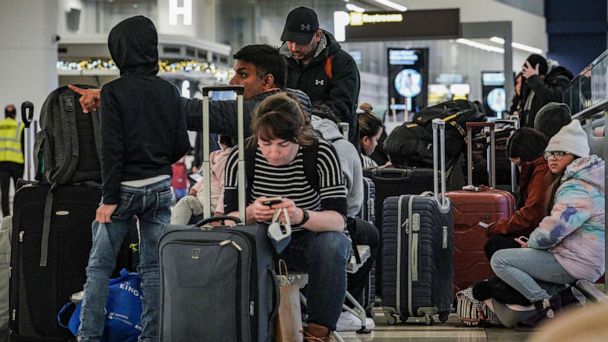
The holiday meltdown at Southwest Airlines last month cost the company as much as $825 million in lost revenue and added expenses, the company said in a government filing on Friday.
Southwest Airlines, the largest domestic airline in the U.S., canceled more than 16,000 flights over an 11-day period at the end of December, the filing said.
The disarray amid a massive snowstorm stranded droves of customers during a peak travel season, prompting the company to apologize and offer reimbursement for inconvenienced travelers.
"The cost is definitely a significant amount," Ross Feinstein, industry veteran and former director of operations communications at American Airlines, told ABC News.
"I'm not surprised that this is the hit they will ultimately take, in terms of the sheer number of passengers affected and the number of flights canceled," added Feinstein.
Roughly half of the cost stemmed from lost sales, the company said.
The remaining cost went to reimbursements for affected passengers, as well as frequent-flier points offered as a "gesture of goodwill" and extra compensation for workers, the company said.
Southwest Airlines this week announced that it would provide each affected passenger with 25,000 frequent flier points, which the company equated to about a $300 value.
If an airline cancels a flight, meanwhile, a customer is entitled to a full refund by law, according to the Department of Transportation.
In addition, Southwest Airlines vowed to "honor reasonable requests for reimbursement for meals, hotel, and alternate transportation," the company said.
Last week, in an exclusive interview with "Good Morning America," Southwest Airlines CEO Bob Jordan apologized for the debacle.
"There's just no way almost to apologize enough because we love our customers, we love our people and really impacted their plans," Jordan said. "There will be a lot of lessons learned that come out of this."
In October, Southwest Airlines predicted strong financial performance over the final three months of 2022, estimating an increase in operating revenue of as much as 17% compared with the same period in 2019.
The holiday meltdown appears to have scuttled those aspirations. Compared with the same period two years prior, the company now estimates a 6% decline in carrying capacity, which measures the total number of passengers transported over a combined number of miles, the filing said.
Despite the news of the company's financial blow, the price of Southwest Airlines shares inched upward in early trading on Friday.
Since the beginning of the debacle, on Dec. 21, Southwest Airlines stock has fallen about 6%.
All in all, the company will likely overcome the blow to its reputation, said Feinstein.
"If Southwest fixes this issue so that it doesn't happen again, future passengers will forget and move on," he said. "When they're buying a flight, passengers typically book on price and schedule."
The historic scale of cancellations at Southwest sprang from the company's uniquely complex flight coordination model and its antiquated internal scheduling systems, flight experts, Southwest Airlines officials and union leaders previously told ABC News.
The announced cost of the meltdown does not include potential remedies for such issues, Feinstein said. The company will likely take on the added cost of updating its internal programming system to avoid another possible wave of cancellations, he added.
"There will be additional money spent and programmed for IT infrastructure," he said. "That's important before any other project - to make sure this doesn't happen again."







